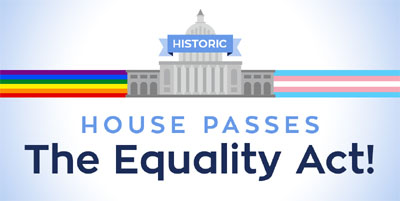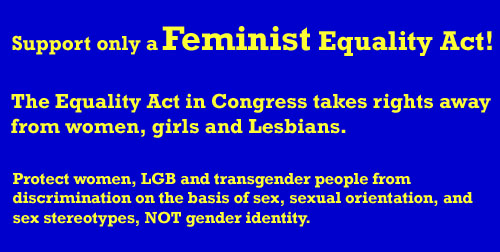The newly formed Coalition for the Feminist Amendments (“CoFA”), consisting of FIST, the LGB Alliance USA, XX Amazons, the Georgia Green Party and others, kicked off its campaign at a zoom forum on November 14, 2020 attended by over 150 people. The four speakers, Ann Menasche (FIST member and co-author of the FAEA, Tina Minkowitz (FAEA co-author), Callie Burt (Associate professor, Georgia State University), and M. Lynette Hartsell (LGB Alliance USA), gave an in depth analysis of the Feminist Amendments and made a compelling case for joining this effort. The presentations were followed by questions and comments by attendees. After the official program ended, 20 or more attendees were so inspired that they stayed on for another hour and a half and continued the discussion of issues surrounding the struggle to preserve women’s sex based rights.
CoFA’s first action after the forum was to send through U.S. mail to each member of the Senate requesting that they consider the Feminist Amendments and provide us with an opportunity to testify for these amendments. The letter is below. CoFA welcomes more volunteers as this campaign has just begun. CoFA needs feminists and our allies to call their Senators and Congress members and build our base of supporters. If you have not yet endorsed the Feminists Amendments, please sign onto the endorsement page on FIST’s website. And spread the word!
If interested in getting involved in CoFA, please email info@sexbasedrights.org.

*****
Letter to the U.S. Senate
November 16, 2020
To members of the U.S. Senate,
The late Justice Ruth Bader Ginsberg devoted her life to fighting for legal protections on the basis of biological sex. Congress should honor that legacy, and the legacy of so many other women who’ve fought to secure our rights, but most importantly, Congress has a duty to uphold our most basic human rights protections. The current version of the Equality Act (HR 5), now pending in the Senate Judiciary Committee, will risk erasing sex as a protected class in law, weakening protections and undermining the existing rights of females as a unique class, and the progress that’s been made toward achieving equality.
The Coalition for Feminist Amendments to the Equality Act (“CoFA”) is a national alliance of feminist and LGB organizations and individuals. We write to urge hearings on our proposal to amend the Equality Act (to receive testimony on its many problematic provisions), and to provide vital input on how those issues may be fixed. The Feminist Amendments expands civil rights laws to cover lesbians, gay men, bisexuals, transgender, and other individuals who don’t conform to gender stereotypes (roles traditionally imposed based on one’s sex), while continuing to uphold sex-based protections. In doing so, everyone’s rights are protected.
We support many of the positive provisions put forth by the Equality Act. Federal statutory protections for lesbians, gay men, and bisexuals based on sexual orientation are long overdue. We applaud the closure of the loophole that allows the use of religious freedom as legal grounds to allow any person to flout civil rights laws.
At the same time, the Equality Act’s attempt to protect transgender individuals from discrimination — through the creation of “gender identity” as a protected class — creates ambiguity, confusion, and a conflict of rights that must be addressed. The term “gender identity” is subjective, in that it describes a state of mind that may or may not be manifested in dress, grooming, or behavior. This subjectivity opens a loophole ripe for abuse. As it’s used in HR-5, the term provides no objective test useful to a court, which will ultimately litigate the conflicts sure to arise from this legislation. Failure to address these conflicts will threaten long-settled statutory and case law developed to protect the rights of females as a distinctive class.
More importantly, “gender” or “gender identity” is conflated with “sex” throughout the bill, and risks eliminating sex as a protected class in civil rights law. Merging two distinct groups — who have different sets of experiences, discrimination and marginalization — is detrimental to preserving human rights protections currently afforded to females as a uniquely subjugated class.
Female only facilities are an important legacy of women’s organizing, key to the protection of the female sex against male-pattern violence and to the broader participation of women in public life. It’s vital that these basic human rights provisions remain in place.
Male-pattern violence against females is so well-documented that Congress passed the Violence Against Women Act in an attempt to protect them from sexual and physical assault. However, such predatory violence remains pervasive as demonstrated by the “Me Too” movement and numerous well-documented instances of such violations by males in the entertainment business, the military, and even Congress. A Swedish study showed that this pattern of behavior is not mitigated by male-to-female sex reassignment surgery.
Moreover, the current bill’s “gender identity” provisions require that males who identify as women, including those with intact male genitalia (85-90% of males who identify as women retain male genitalia), must be admitted, solely on the basis of “self-identification,” into female facilities, such as, rape crisis centers, battered women’s shelters, homeless shelters, prisons, hospital rooms, communal showers, changing rooms, restrooms, and nursing homes.
Social scientists and international policy bodies have underscored the importance of maintaining separate statistics based on sex, as a key means of tracking disparities between the sexes, recording accurate data, and measuring our progress on addressing sex-based discrimination. In addition, there are multiple instances, such as within the context of health care, where having accurate information about a person’s sex, is vital, even life-saving.
By eliminating sex as a protected class, the bill, as currently written, would:
- Undermine targeted remedies for the exclusion or under-representation of women and girls in education, and in jobs and professions traditionally held by men
- Eradicate competitive women’s sports by undermining Title IX protections
- Make it impossible to measure (and remedy) disparity between the sexes, such as the pay gap and domestic violence
- Prevent the gathering of accurate crime and health statistics
See attached fact sheets for more information on the impact of erasing sex as a protected class in civil rights law, by allowing the concept of “gender” or “gender identity” to override “sex.”
The Feminist Amendments eliminate “gender identity” and instead establish two new categories in civil rights law: “sexual orientation” and “sex-stereotyping.” Doing so more effectively protects all classes, while not negating sex-based protections.
These amendments contain clear definitions of “sex” and “sex-stereotyping,” that will preserve female facilities and programs, allowing women and girls to participate fully in public life. (See attached.)
At the same time, the Feminist Amendments protect lesbians, gay men, bisexuals (and all people who don’t conform to imposed gender roles and stereotypes), including transgender people, from discrimination in employment, housing, credit, and in places of public accommodation.
These amendments also allow for the establishment of “gender neutral” facilities for individuals who may feel safer or more comfortable in such spaces, so long as the availability and access to female only facilities is not diminished. Thus, these amendments allow each protected class to continue to make progress toward achieving true equality.
One hundred years after women’s suffrage, women still get paid less, are denied equal opportunities in the workplace, and continue to be underrepresented in many fields and positions of economic and political leadership in our society, because of their sex. Females still suffer disproportionately from domestic violence and rape because of their sex. Discrimination on the basis of sex will not end if we eliminate sex as a stand-alone protected class.
No Senate action should be taken on the Equality Act without hearings to gather evidence on the conflicts outlined in this letter. We offer the Feminist Amendments to the Equality Act as our contribution to this much needed work.
We and members of our constituent organizations are prepared to sit down with you and members of your staff to discuss our concerns and appropriate strategies we might collaborate on to secure the hearing anticipated in the previous paragraph.
It is our fervent wish that you honor the legacy of our most revered jurist RBG by adopting the Feminist Amendments to the Equality Act to continue her fight to protect women and girls on the basis of sex.
Sincerely,
Ann Menasche
Feminists in Struggle
M. Lynette Hartsell
LGB Alliance USA
Co-Chairs, CoFA
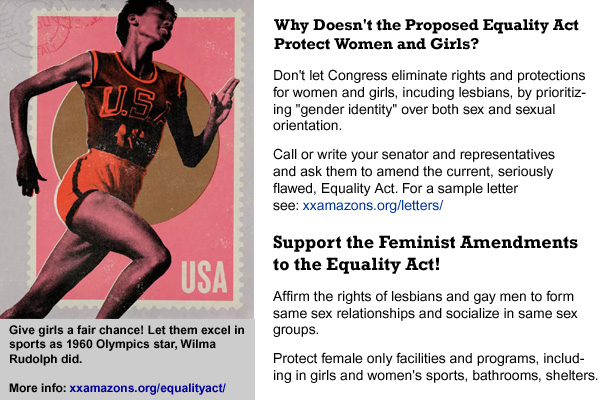

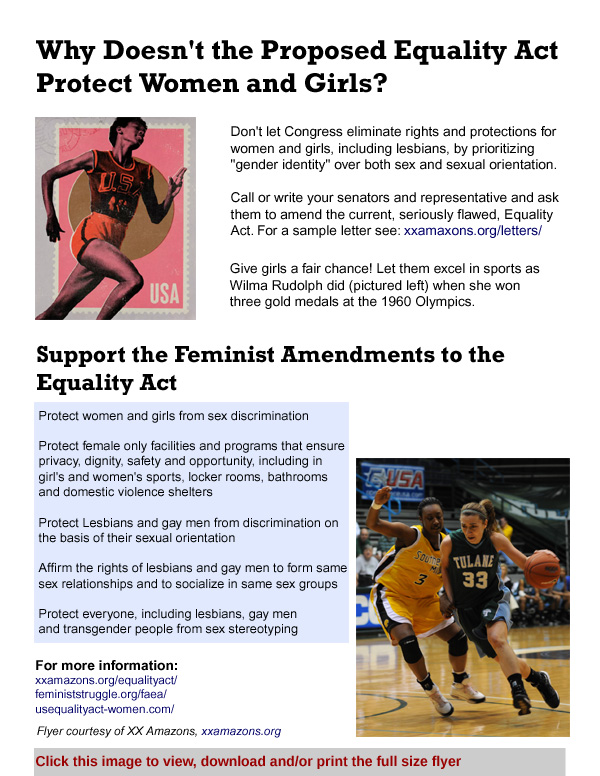

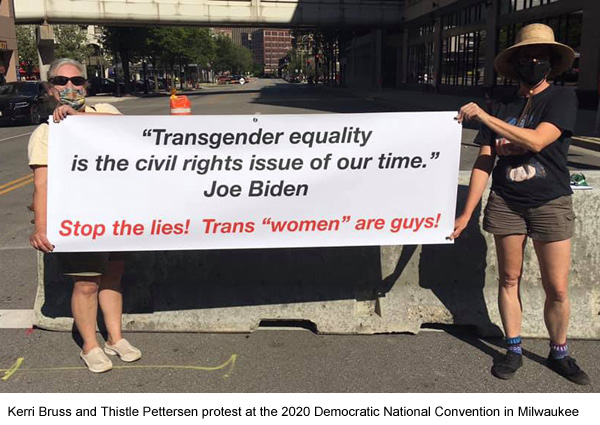
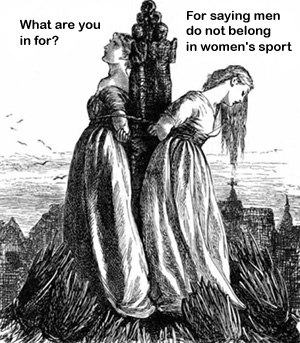 We were also told that unless we recant our alleged heresy and promise to sin no more, we will not be reinstated to the listserv and would be officially removed from caucus membership—metaphorically burned at the stake. How this provides a “safe and supportive place” for women, lesbians, and those who don’t conform to sex-based stereotypes within the Green Party is unclear.
We were also told that unless we recant our alleged heresy and promise to sin no more, we will not be reinstated to the listserv and would be officially removed from caucus membership—metaphorically burned at the stake. How this provides a “safe and supportive place” for women, lesbians, and those who don’t conform to sex-based stereotypes within the Green Party is unclear.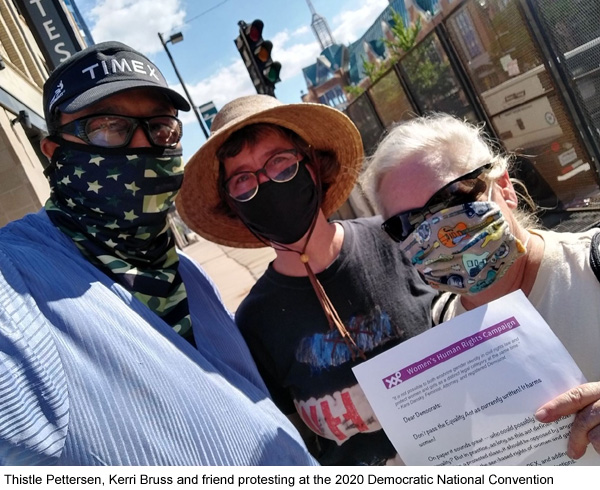
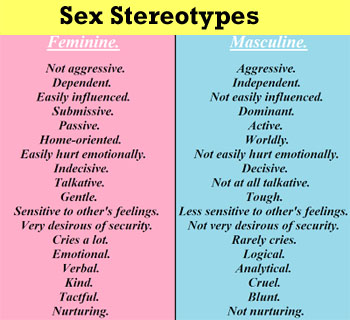 The central feature of the FAEA is that it protects everyone against sex stereotyping, broadly defined to include ‘the expectation that individuals will manifest behaviors, appearance, dress, grooming, interests and personality stereotypically associated with their sex and refrain from manifesting those associated with the other sex. Discrimination based on an individual’s nonconformity with such expectations constitutes sex-stereotyping discrimination. Sex stereotyping also includes the notion that sexual orientation will be heterosexual for both sexes (i.e. part of the stereotype of masculinity is being attracted to women, and part of the stereotype of femininity is being attracted to men).’
The central feature of the FAEA is that it protects everyone against sex stereotyping, broadly defined to include ‘the expectation that individuals will manifest behaviors, appearance, dress, grooming, interests and personality stereotypically associated with their sex and refrain from manifesting those associated with the other sex. Discrimination based on an individual’s nonconformity with such expectations constitutes sex-stereotyping discrimination. Sex stereotyping also includes the notion that sexual orientation will be heterosexual for both sexes (i.e. part of the stereotype of masculinity is being attracted to women, and part of the stereotype of femininity is being attracted to men).’ The FAEA model bill defines sex as being female or male, based on reproductive structure and function, with the potential to adjust determinations made about intersex persons. It contains findings that address the systemic nature of sex-based discrimination and the need for sex classification ‘in order to separate biological differences from socially assigned stereotypes and to name, reject, and ultimately dismantle the system of disadvantage and advantage, domination and inequality of power and resources that society has created with respect to these biological differences…. Affirmative recognition of the different biology of females and males is furthermore necessary to combat discrimination against women, since male-dominated institutions have routinely failed to adequately take account of women’s biology on an equal basis with that of men when formulating policy and practice that deals with the human body, in areas such as health care, design of goods and services, provision of adequate sanitary facilities, and competition in some sports. When doing so, the ultimate goal should be equalizing power and resources between women and men.’
The FAEA model bill defines sex as being female or male, based on reproductive structure and function, with the potential to adjust determinations made about intersex persons. It contains findings that address the systemic nature of sex-based discrimination and the need for sex classification ‘in order to separate biological differences from socially assigned stereotypes and to name, reject, and ultimately dismantle the system of disadvantage and advantage, domination and inequality of power and resources that society has created with respect to these biological differences…. Affirmative recognition of the different biology of females and males is furthermore necessary to combat discrimination against women, since male-dominated institutions have routinely failed to adequately take account of women’s biology on an equal basis with that of men when formulating policy and practice that deals with the human body, in areas such as health care, design of goods and services, provision of adequate sanitary facilities, and competition in some sports. When doing so, the ultimate goal should be equalizing power and resources between women and men.’ Here are
Here are 